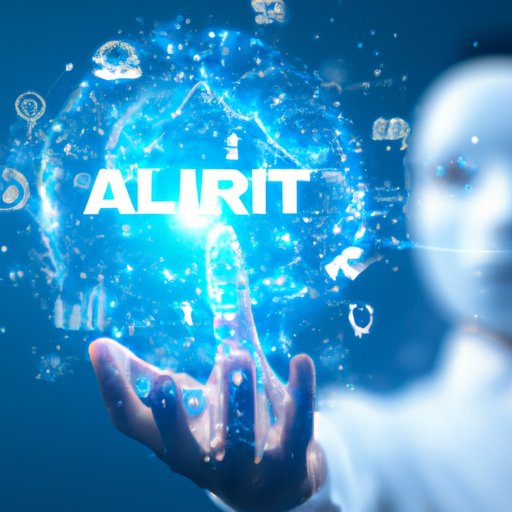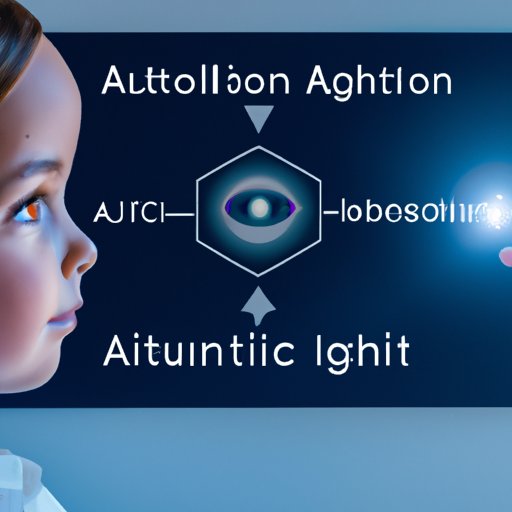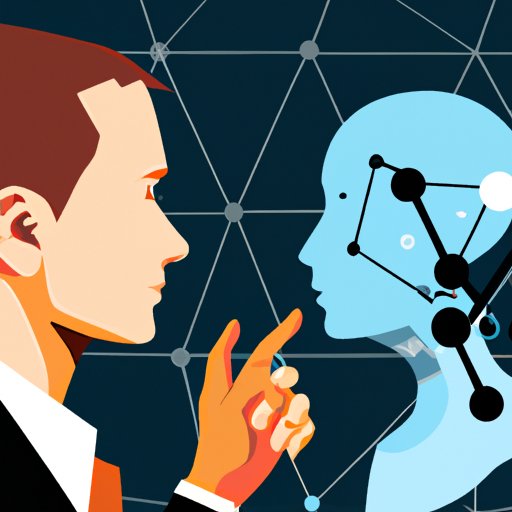Introduction
Artificial intelligence (AI) is quickly becoming an integral part of our lives, with applications ranging from self-driving cars to intelligent virtual assistants. But what exactly is AI, and why does it matter? This article seeks to answer these questions by exploring the impact of AI on businesses, work, healthcare, environment, education, and the ethical implications of AI.
Exploring the Impact of AI on Businesses
Today, AI is transforming the way businesses operate, from automating tedious tasks to optimizing decision-making. Here are just some of the ways AI is impacting businesses:
Increased Productivity
AI can help businesses increase their productivity by automating mundane tasks and freeing up employees’ time for more meaningful work. AI-powered chatbots, for example, can handle customer inquiries 24/7, reducing the need for human customer service representatives. AI can also be used to streamline processes such as supply chain management and inventory tracking.
Improved Decision-Making
AI can help businesses make better decisions by providing insights based on data analysis. AI-driven analytics can identify patterns and trends that would otherwise be invisible to humans, allowing businesses to make informed decisions about pricing, marketing strategies, and more. AI can also be used to optimize operations, such as scheduling staff and managing inventory.
Enhanced Customer Service
AI can improve the customer experience by providing personalized recommendations and faster response times. AI-powered chatbots can respond to customer queries instantly and provide tailored product recommendations based on customers’ past purchases. AI can also be used to detect fraud and prevent cyberattacks, improving customer security.

How AI is Changing the Way We Work and Live
AI is changing the way we work and live, from automation to predictive analytics. Here are just some of the ways AI is impacting our lives:
Automation
AI-powered automation is revolutionizing the way we work, from manufacturing to customer service. Automation can reduce labor costs and increase efficiency, allowing businesses to do more with less. Automation can also improve safety by reducing the risk of human error.
Predictive Analytics
Predictive analytics is one of the most powerful applications of AI. Predictive analytics uses machine learning algorithms to analyze large amounts of data and make predictions about future outcomes. This can be used to predict customer behavior, anticipate demand, and optimize operations.
Autonomous Vehicles
Autonomous vehicles, or self-driving cars, are one of the most visible applications of AI. Autonomous vehicles use AI to navigate roads and avoid obstacles, making them safer than traditional vehicles. Autonomous vehicles also have the potential to reduce traffic congestion and emissions.
Examining the Role of AI in Healthcare
AI is playing an increasingly important role in healthcare, from diagnostics to treatment planning. Here are just some of the ways AI is impacting healthcare:
Diagnostics
AI-powered diagnostics can help doctors identify diseases more accurately and quickly. AI-driven image recognition, for example, can be used to detect anomalies in medical images such as X-rays and CT scans. AI can also be used to analyze patient data to detect patterns and predict disease progression.
Treatment Planning
AI can be used to develop personalized treatment plans, taking into account a patient’s medical history and lifestyle. AI-driven algorithms can analyze large amounts of data to identify the best possible course of treatment for a given patient.
Personalized Medicine
AI can be used to develop personalized medicines tailored to an individual’s genetic makeup. AI-driven algorithms can analyze genomic data to identify mutations that could lead to disease, allowing for early diagnosis and treatment.
Harnessing AI to Solve Environmental Challenges
AI is also being used to address some of the most pressing environmental challenges, from climate change to water conservation. Here are just some of the ways AI is being used to protect the environment:
Climate Change
AI can be used to monitor and predict climate change. AI-driven algorithms can analyze data from satellites and other sources to detect changes in weather patterns and track the spread of deforestation. This can help us better understand and mitigate the effects of global warming.
Water Conservation
AI can be used to optimize water usage and reduce waste. AI-driven algorithms can analyze data from sensors to detect leaks and optimize irrigation systems. This can help reduce water consumption and conserve resources.
Air Quality Monitoring
AI can be used to monitor air quality and identify sources of pollution. AI-driven algorithms can analyze data from sensors to detect changes in air quality and pinpoint sources of pollution. This can help us take steps to reduce air pollution and protect public health.

Exploring the Benefits of AI for Education
AI is also transforming the way we learn, from intelligent tutoring systems to adaptive learning. Here are just some of the ways AI is impacting education:
Intelligent Tutoring Systems
AI-powered intelligent tutoring systems can provide personalized instruction to students. AI-driven algorithms can analyze data from students’ interactions with the system to detect areas of difficulty and provide targeted instruction. This can help students learn more effectively and efficiently.
Automated Grading
AI can be used to automate grading, freeing up teachers’ time for more meaningful work. AI-driven algorithms can analyze student essays and provide feedback on grammar, spelling, and organization. This can help teachers spend less time grading and more time teaching.
Adaptive Learning
AI can be used to create adaptive learning environments. AI-driven algorithms can analyze data from students’ interactions with the system to adjust the difficulty level and provide personalized instruction. This can help students learn at their own pace and maximize their potential.

Investigating the Ethical Implications of AI
As AI becomes more pervasive, it is important to consider the ethical implications of its use. Here are just some of the ethical issues associated with AI:
Privacy Concerns
AI can be used to collect and analyze vast amounts of data, raising concerns about privacy. AI-driven algorithms can detect patterns in data that would otherwise be invisible to humans, leading to potential abuses of power. To ensure the ethical use of AI, it is important to put in place safeguards to protect individuals’ privacy.
Unintended Consequences
The use of AI can have unintended consequences, such as job losses due to automation. It is important to consider the potential impacts of AI on society and take steps to mitigate any negative effects.
Bias in Algorithms
AI-driven algorithms can be biased if they are not trained properly. This can lead to unfair decisions, such as denying someone a loan or a job. To ensure the ethical use of AI, it is important to identify and address any bias in algorithms.
Conclusion
In conclusion, AI is transforming the way we work and live, from businesses to healthcare to education. AI can be used to automate mundane tasks, optimize decision-making, and improve the customer experience. AI can also be used to solve environmental challenges, from climate change to water conservation. However, it is important to consider the ethical implications of AI, such as privacy concerns and bias in algorithms. As AI continues to evolve, it is essential that we explore the potential benefits and risks of AI to ensure its ethical use.
(Note: Is this article not meeting your expectations? Do you have knowledge or insights to share? Unlock new opportunities and expand your reach by joining our authors team. Click Registration to join us and share your expertise with our readers.)
